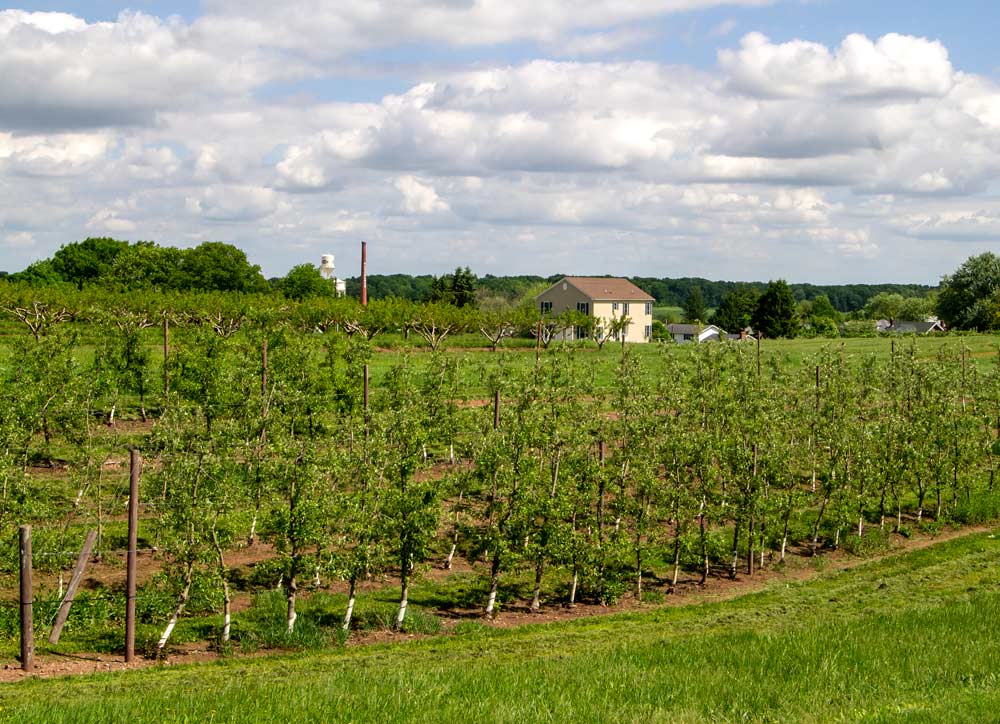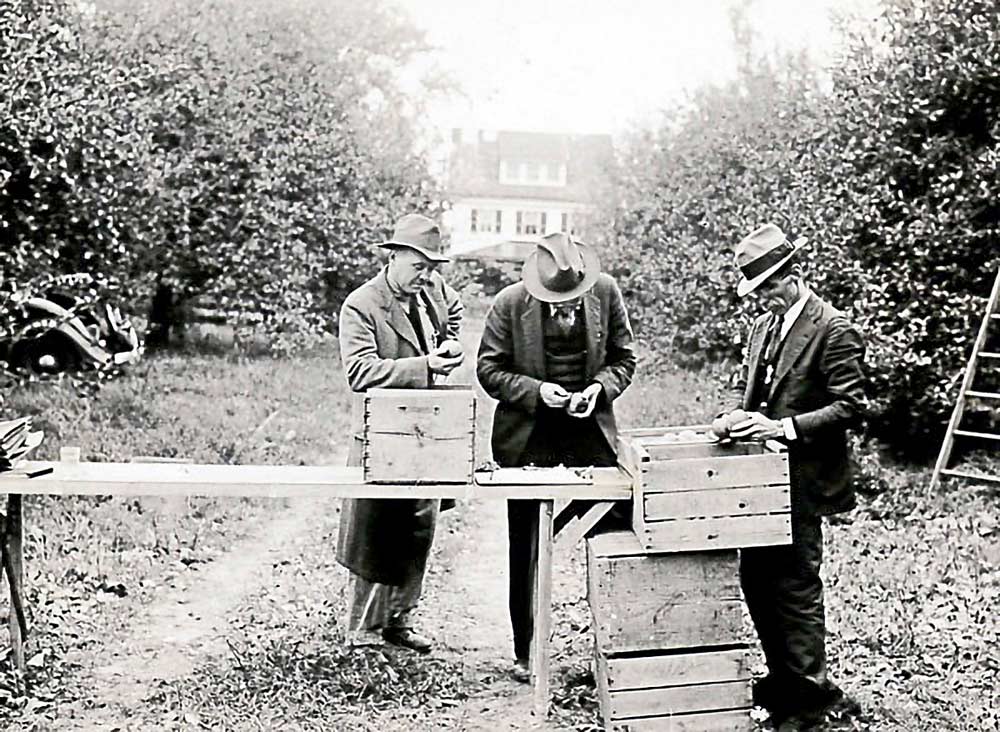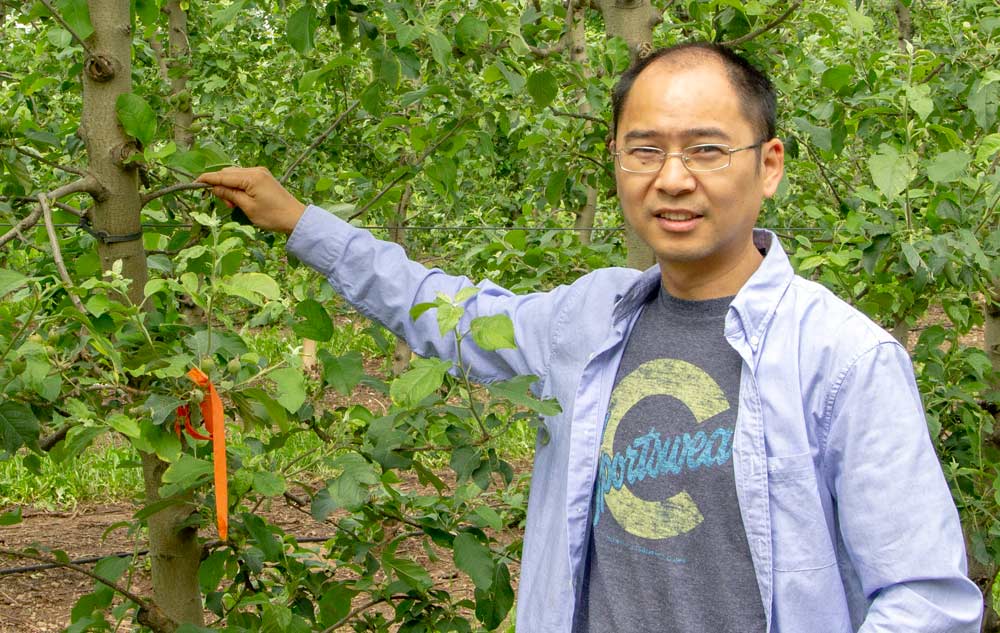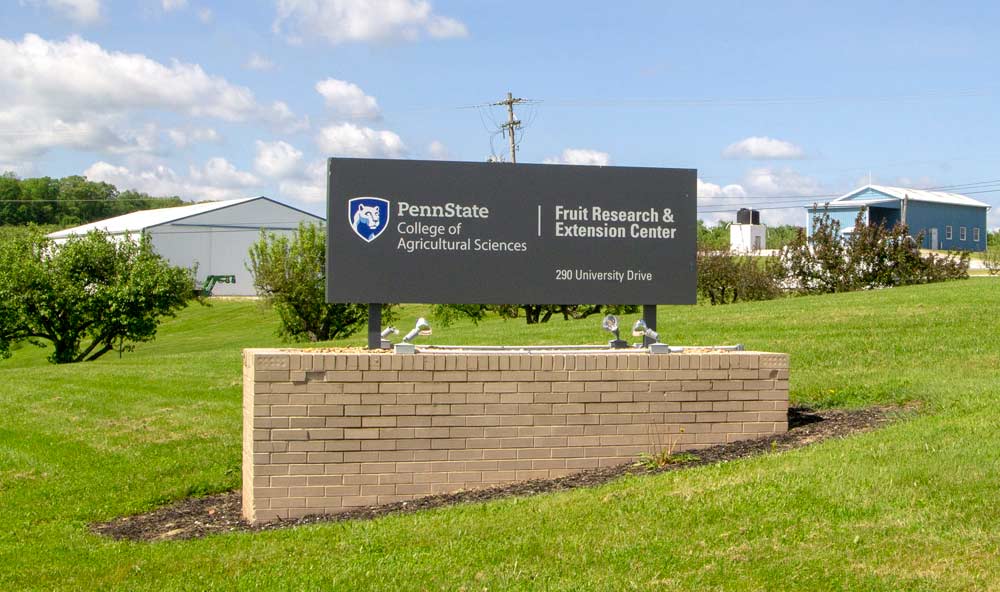
New graduate student housing, built with funding from fruit growers, overlooks research orchards at Penn State Fruit Research and Extension Center in Biglerville, Pennsylvania, on May 23, 2018. (Kate Prengaman/Good Fruit Grower)
A century ago, Pennsylvania apple growers were struggling to compete with the burgeoning Washington apple industry, which was shipping boxes of graded fruit in refrigerated rail cars to eastern U.S. markets, outselling local apple barrels.
So growers in the Adams County fruit belt, where commercial orchards boomed in the early years of the 20th century after San Jose scale outbreaks took out the small home orchards common in the region until then, asked Penn State University for help. The campus, located about two hours north, sent an entomologist and a pathologist down to help local growers in 1918.
“The eastern apple industry had a lot of problems by 1916. Lots of growers went out of business and those who stayed modernized, and they’ve been at it ever since,” said Jim Schupp, horticulturist and director of the research center that started with those two scientists a century ago. It’s now known as the Penn State Fruit Research and Extension Center, located on 180 acres in the heart of the state’s tree fruit production in Biglerville.

Researchers Dean Asquith, Frank Hewetson and Fred Lewis inspect fruit at the Fruit Research Lab in Arendtsville, Pennsylvania, in an undated photo believed to be from the 1940s. (Courtesy Penn State Fruit Research and Extension Center)
The center is celebrating its centennial this month with a field day on July 10 to highlight the research efforts by the center’s team: two entomologists, a horticulturist, a pathologist, and a newly hired ag systems engineer, along with numerous graduate students, orchard and support staff.
Known locally as the Fruit Lab, research now operates out of facilities built by donations from the Musselman Foundation in 1970, Schupp said. Christian and Emma Musselman started an apple processing plant in Biglerville in 1907 and as their business grew, they went on to create a foundation that continues to support local schools, libraries and hospitals.
The fruit industry continues to fund the research center, raising about $250,000 a year for research grants and recently donated $250,000 for construction of on-site housing in 2016 for up to eight graduate students who divide their time in the orchards and on campus two hours north.
“For the size of our industry, that’s really significant,” Schupp said. “The housing has boosted our ability to produce more scientists. It’s been a terrific thing.”

Agricultural engineer Long He was recently hired by Penn State. (Kate Prengaman/Good Fruit Grower)
The close relationship between the industry and the university is also apparent in the center’s newest researcher, agricultural engineer Long He.
“Our new dean met with the fruit industry and asked them, ‘What do you need from Penn State?’ And they said we need an ag engineer,” Schupp said. They got two — He, who joined the center in January, and Daeun Dana Choi, who joined the Agricultural and Biological Engineering program on the main campus.
“It’s win-win-win for us,” Schupp said. “Now, when we send farm kids to Penn State, they can take classes in specialty crop engineering.”
Ongoing research today includes:
—Rearing brown marmorated stink bugs to study the biocontrol possibilities of wasps that parasitize their eggs.
—The potential to blossom thin apples with lime sulfur.
—Investigating the mysterious collapse of young, dwarfing apple trees observed at the center and around the region, from New York to Virginia.
—Testing high-density peach systems.
—Efforts to track and update growers on pest and pathogen pressures and find the best strategies for control.
—Studying a new invasive pest, the spotted laternfly.

The Penn State Fruit Research and Extension Center on 180 acre in Biglerville, Pennsylvania is the current home of the research efforts to serve the region’s tree fruit growers that started in 1918. (Kate Prengaman/Good Fruit Grower)
One hundred years after those first scientists set up shop in a hotel in Arendtsville and began experiments in growers’ orchards, the goal of the work today is surprisingly similar: keep the region’s growers competitive.
“It’s hard to compete with Washington,” said John Lott, owner of Bear Mountain Orchards, one of the larger fruit producers in the region with about 1,000 acres of apples, peaches and other stone fruit. “In Adams County, we’ve gone from 470 growers to less than 100. We can compete, but for small farms on the scenic Pennsylvania hills, it is getting harder and harder.”
Bear Mountain now grows about 70 percent of its apples for the fresh market, with new plantings increasing in density after learning from trials in partnership with the Penn State Research and Extension staff, said farm manager Joy Cline.
“When I started here, we planted at 122 trees per acre. The thought process of higher density is definitely a learning curve,” she said, adding that her latest plantings are 14 feet-by-4 feet and 12 feet-by-3 feet. “We’re so lucky to have the fruit lab folks here in our backyard.” •
Centennial Celebration
The Fruit Research and Extension Center will hold its Centennial Celebration and Field Day on July 10 from 10 a.m. to 4 p.m. Faculty, students and staff will share recent research in both field and poster sessions. For more information, contact Karen Weaver at ksw5@psu.edu or (717) 677-6116.
—by Kate Prengaman






Leave A Comment